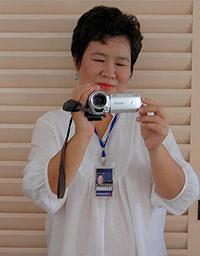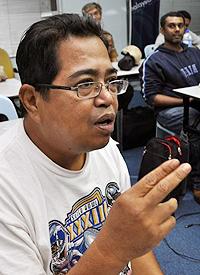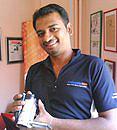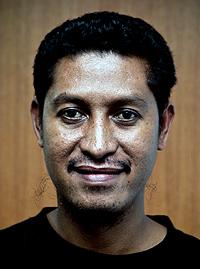Since launching the Malaysiakini's citizen journalism course two years ago, the independent news website has helped empowered more than 180 Malaysians to be the voice of their communities.
This weekend, this pioneering group of citizen journalists have a reunion of sorts at the inaugural Citizen Journalism Conference 2010, held at the Central Market Annexe in Kuala Lumpur.
The conference, timed in conjunction with May 3 World Press Freedom Day, is the first of its kind in Malaysia.
At the two-day conference, citizen journalists from all across the country hold discussions on issues concerning citizen journalism, share their work and reports, and attend workshops to further hone their journalistic skills.
Malaysiakini speaks to four citizen journalists about their role and the challenges they face.
Lillian Chan , 45, blogger and mother of five, Penang
How did you find out about the citizen journalism course?
 I've been a regular reader of
Malaysiakini
even before March 8, 2008 (general election). It has somewhat ‘converted' me to become bolder in making my voice heard as a citizen. I wrote on issues that were exposed by
Malaysiakini
in my blog. I believe my writings have influenced blog readers to vote for change.
I've been a regular reader of
Malaysiakini
even before March 8, 2008 (general election). It has somewhat ‘converted' me to become bolder in making my voice heard as a citizen. I wrote on issues that were exposed by
Malaysiakini
in my blog. I believe my writings have influenced blog readers to vote for change.
So when there was an announcement (regarding the citizen journalism course) on Malaysiakini, I gladly grabbed the opportunity because I want to write and express myself well.
What got you into blogging in the first place?
Initially, the Malaysian blogosphere started out as mostly tech bloggers, food bloggers or personal bloggers. Previously, I had contributed articles to the Star's parenting column, women and parenting magazines on an ad-hoc basis. I started blogging in 2003, writing about personal stuff because I was intrigued by the concept of ‘live publishing'. So Blogger.com became my outlet to write.
Later on, (DAP politician) Jeff Ooi's political postings and his exposés got me interested in writing about politics.
You are very outspoken in your blogs. Do you find it difficult to juggle between being a blogger and a citizen journalist?
Actually, I believe that having a strong opinion helps in citizen journalism. It is only when we can form our own opinion that we are able to present an issue with clarity. Otherwise, our viewers or readers cannot get the message we want to convey.
However, I am always mindful that when I am donning my CJ press tag and when I am out covering assignments, I do not force my opinions on others nor lead my interview subjects on with things to suit my views.
How has learning video making and editing helped you with your blog?
I already have a large pool of regular blog readers. That includes my siblings, nephews and nieces, my church members including some of my priests, friends and regular followers. Instead of just writings and posting photos, now they have videos to keep them updated with issues that are close to my heart. My videos are about things that interest me. So it is really an added bonus.
As a mother, do you have any worries about being harassed by the government?
I am always mindful of what is written and posted on my blog. As I am a Catholic, I have added pressures when the Allah's issue cropped up because one of my ‘faith' blog appeared high on search engines as I have a Bahasa Malaysia Bible.
I received comments which I considered to be 'baits' (to get me into deep trouble, e.g. comments like 'I am a Muslim and I want to know about Jesus') which I think can put me into trouble. So, I scrutinise not only what I express but also what the commentators say.
Though I do get very loud on certain political matters, these are matters that either affect me directly such as my children's education or things that I feel is my responsibility as a citizen to protest. If I am really in trouble over them, I will have to face the consequences and hope people will hold candlelight vigils for me. (Laughs)
I have never directly been rude to any politicians or any institutions. There are always ways to express things without openly asking for trouble.
Akmal Ariffin
, school teacher, TermelohWhy did you want to join the citizen journalism course?
I joined out of curiosity and I have always wanted to be a journalist.
What is the one lesson from the course that you think would benefit you most?
The lesson in writing an article accurately.
 How would you apply what you have learned from the course in your news reporting?
How would you apply what you have learned from the course in your news reporting?
I now have a bigger perspective on the articles that I write. Unfortunately, I have not been able to apply the video journalism lessons that I have learnt.
As a school teacher for a government school, will becoming a citizen journalist affect your work? Has the course contributed to a different way of educating your students?
Being a CJ has not affected my work as I have kept them apart. As far as teaching is concerned, I have taken a more research-based approach when teaching students on the art of writing.
Why do think citizen journalists are important?
I think CJs are important because they are independent and have great passion for their work. They too are closer to the issues and therefore have the tendency to be idealistic and truthful.
Arvind Raj , 33, event management consultant, Kuala Lumpur
What are the means through which citizen journalists report news in Malaysia?
CJs can contribute to news reporting through many ways such as blogs, news portals and interactive web applications like Facebook and Twitter. CJs are the best channel for truth and on-the-ground reporting.
Did you find the course intense and fast-paced? How did you cope?
 Yes, it was intense and fast-paced, but we improve through experience. The course itself was not sufficient for us to perform as full-fledged CJs. Determination and interest also play a very important role here.
Yes, it was intense and fast-paced, but we improve through experience. The course itself was not sufficient for us to perform as full-fledged CJs. Determination and interest also play a very important role here.
Not all the CJs are performing at the same pace; some are active and some are slow, and some of them only cover political or environmental issues - issues that they are interested in.
Do you find it difficult to report news objectively without being too personal in your writing?
Sometimes it is difficult to report news without being personal, but in many cases we try to write as it is. If a party is wrong, we try to show they are wrong with evidence.
You have had your equipment confiscated before. How do you deal with the authorities when it comes to reporting political issues?
Reporting political issues in Malaysia is like walking on glass shreds. You have to be cautious in order for you not to be in a difficult position. In some cases, we just use words from the politicians as they are, but to be fair, we publish both the parties' views in the same report and let the public make their own decision.
Do you think that citizen journalism is the new wave of journalism and can be trusted?
I agree 100 percent. Yes, it is a new wave, and it can be trusted. Just look at the video published by our Cjs - some of the issues might not be reported by any news agency, but they are small issues with big impact.
For example, a video on a live wire on the roadside near a bus stop which I'm processing now. This is an issue that can result in fatality if not reported and I don't think any (mainstream) journalist will cover this issue. We are bringing light to everyday life as well as the burden which citizens have to endure.
Alberico Junior , 36, Timor-Leste Media Development Centre media monitoring and news subscription manager
 How did you come to join the citizen journalism course in Malaysia?
How did you come to join the citizen journalism course in Malaysia?
I was invited and supported by Seacem (Southeast Asia Centre for E-Media). My training here is on field journalism, editorial policy and marketing.
How is Malaysian news reporting different from Timor-Leste?
There is no difference in terms of news reporting in Timor-Leste and Malaysia. However, the journalists are living in a different environment. Technically, journalists in Malaysia are more advanced, experienced and equipped with high technology.
But we are living in a different political situation where press freedom in Timor-Leste is guaranteed, while here in Malaysia it is a problem.
Do you think that citizens can make a difference in the way news is reported?
I think so. Normal people could report differently from professional journalist as they can report it their own way on how news could impact people's lives.
How have you benefitted from attending the course?
It was a great opportunity for me to learn and I will implement it back in my country, mainly on how to develop my own online newspaper.

